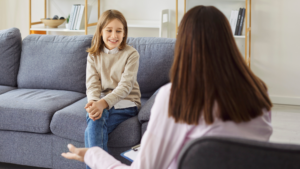Feelings of sadness, anxiety and even disappointment are not uncommon for newly adoptive parents. Learn about the signs of PADS and what you can do if you’re struggling with these feelings.
Sometimes the adoption process can feel like a rollercoaster—it has many highs and lows, and the journey never feels like a straight line. When the big moment arrives and adoptive parents finally bring their new child home, from the outside it may seem like it’s the start of a blissful family life. Among the many bumps that can occur in the road, some new parents experience post-adoption depression syndrome (PADS). Similar to postpartum depression, PADS occurs for various reasons, and it can leave parents feeling sad, let down and guilty. Though it can be uncomfortable to discuss, post-adoption depression is relatively common and nothing to feel ashamed about.
Dori Fujii, Adoptive Parent Counselor and Post-Adoption Therapist at The Cradle, frequently counsels new parents living with PADS. She shares her thoughts on this complex issue, including common signs of PADS and some effective methods for addressing these challenging feelings.
What Is Post-Adoption Depression Syndrome (PADS)?
Coined in 1995 by adoption professional June Bond, PADS refers to the anxiety, stress and depression experienced by some parents following adoption. While it is not a formally recognized disorder, PADS is starting to garner well-deserved attention, inspiring new research.
There are a variety of different factors that can cause PADS. Parenting is inherently stressful, which can play a major role, as can the lack of sleep that many new parents experience. Stress can be amplified by bonding challenges and times when a child’s needs are more significant than anticipated. It’s also normal to feel depressed after accomplishing major life goals and reaching big milestones (there’s even a term: post-achievement depression). When the sense of planning and anticipation that kept parents focused on a big moment disappears, they can feel anchorless and sad.
Some newly adoptive parents have trouble reconciling their expectations with the reality of parenting. That can lead to feeling let down and then confused by those feelings, questioning why they aren’t happy. “The reality is that parenting a newborn or parenting a child from a difficult background is extremely challenging,” Fujii says. “And any new parent… biological or adoptive, will tell you it is way more difficult than anybody could ever tell you it would be.”
Additionally, parents who have come to adoption due to infertility, pregnancy loss or the loss of a child may be especially susceptible to PADS. Fujii explains that in these situations, bringing a child home could reignite unresolved feelings of grief.
Who Can Get PADS and How Common Is It?
Adoptive parents of any gender, race, socioeconomic class and sexual orientation can suffer from PADS. Some studies suggest it is more likely to affect women, but more research is needed to fully understand how PADS impacts all parents.
Though limited in their scope, past studies have found that 10-30% of adoptive parents will experience PADS. Fujii believes these rates are actually underreported because parents may fear being stigmatized and facing repercussions before their adoptions are finalized.
“You’re worrying that your agency maybe won’t approve the adoption or somebody’s going to think you’re a bad parent,” she says. “I think adoptive parents have a tendency to feel that they’re being watched and judged.” Fujii wants people to know that acknowledging they need help makes them better parents and won’t complicate their adoption process.
How to Identify if You’re Struggling With PADS
Recognizing that you have PADS is the first step toward getting help and effectively treating it. It’s essential to take care of your mental health, not only for your sake but for the sake of your family and those around you.
The following are common PADS symptoms:
- Extreme fatigue or loss of energy – You feel completely exhausted and devoid of energy all the time (beyond the usual new parent tiredness).
- Loss of enjoyment – The things you used to love in daily life no longer bring you joy.
- Lack of bonding – You’re not bonding with your child and/or you don’t feel attached to them like you thought you would.
- Excessive guilt – You feel like a bad parent. You may feel guilty for questioning your choice to adopt.
- Irritability – You are easily irritated by circumstances and the people around you.
- Sense of worthlessness and hopelessness – You feel bad about yourself and your parenting skills, and you don’t feel like things will ever improve.
- Difficulty concentrating – You find it hard to focus and make decisions.
- Issues with sleeping – You’re unable to get sufficient sleep, or you have an increased need for sleep.
What to Do if You Have Post-Adoption Depression
The good news is there are many ways to address PADS. However, many of these methods take patience and practice. You won’t instantly get better overnight, but you will see marked improvement over time.
Take care of yourself – This may seem easier said than done for a new parent, but it is crucial to look after yourself. Self-care allows you to be your best self and a better parent. Do your best to eat well, move your body regularly and get enough rest. Prioritize scheduling downtime for activities you enjoy. Remember, self-care is not selfish!
Give yourself time to bond – Bonding happens at a different pace for everyone. It’s not always “love at first sight,” and that’s okay. Attachment can be a slow process for you and your child, so be patient. Your bond will grow as you spend more time together and get to know each other.
Reframe your expectations – Adjust what you expect from yourself, your child, family, friends and society. When you reframe expectations, you allow yourself to refocus energy in a positive direction. For example, instead of saying, “I always need to be the best parent,” you can say, “I will be the best parent I can be while allowing myself grace for my mistakes.”
Know that you are not alone – Many other adoptive parents have felt exactly what you’re feeling. Connect with parents experiencing similar challenges to exchange advice and offer support. Fujii suggests becoming part of an adoptive family group to build an adoption-smart support network you can depend on for help.
Ask for help – You should never feel ashamed to reach out to family, friends or professionals for help. It’s normal to experience depression and anxiety after bringing a new child into your home. It’s also completely normal to need support and seek professional assistance from a therapist who understands your situation and knows how to best support you, including prescribing medication if necessary. The Cradle specializes in adoption-competent counseling and can help you navigate PADS and other bumps in the road.
Find Support at The Cradle
Adoption is a journey, and there are bound to be bumps in the road. But with the proper support, you can navigate the rough patches and appreciate the good parts of each and every day. We’re here to help you on your journey with education resources and one-on-one support from our adoption-competent therapists. You can request an appointment with one of our counselors through our online form or by calling us at 847-733-3225.














